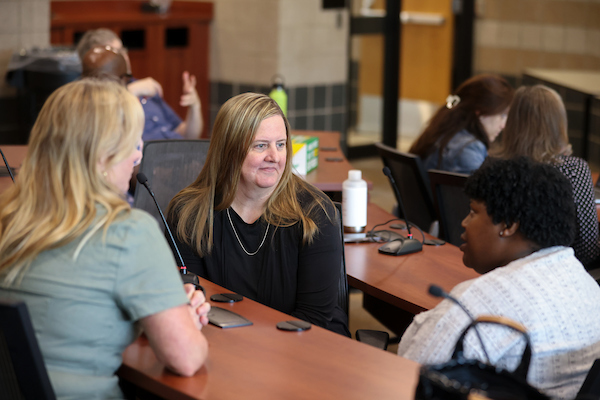
Race, Power, and Justice in Business Series Brings Curriculum to Staff, Faculty
Monday, August 5, 2024
By Charly Haley
A first-of-its-kind summer series provided Carlson School faculty and staff a closer look at the Race, Power, and Justice in Business course, which aims to help students understand how historical and systemic inequalities still affect business and workplaces today.
The required course, BA 3001, rolled out to all second-year students last fall as part of the redesigned Undergraduate curriculum. As interest in the course grew, the instructors started to hear a common refrain from staff and faculty members.
“People would say, ‘This sounds like a really great class, I wish I could take it,’” says Professor John Budd, who co-created the course. “Based on a number of people wanting to learn more about the course content, we decided to put on this summer series.”

Budd worked with Senior Lecturer Todd Williams and Assistant Professor Nitya Chawla—all from the Work and Organizations Department—to create the series, which ran for six sessions held in-person with a Zoom option. The sessions tackled topics such as racial capitalism; racial discrimination in data; effective diversity, equity, and inclusion (DEI) ecosystems, and allyship.
“It’s a sampler bite of what the students are experiencing,” Williams says. “We were very intentional in how we architected the series. We brought folks into the conversation with a historical construct, then brought it forward into common practices of what’s actually happening in industry today, and then examined the next phase of understanding how individuals can practice allyship and leverage their privilege on behalf of others.”
All three instructors were pleased with the turnout and discussions in their sessions.
“Overall, the positive reception that we received and the engagement that we’ve seen—both in terms of the numbers of people showing up but also the conversations that have happened—is a pretty big testament to how much our community at the Carlson School cares about these topics,” Chawla says.
Those conversations, Williams says, highlight the importance of fostering future discussions about DEI.
“There is something about taking topical content and engaging with it in a way that affords collective growth,” he says. “We didn’t specifically set out to do this, but it did happen because I believe we created a safe space for exploration and curiosity.”
Chawla adds that she was impressed by her colleagues’ commitment to continuing their own learning by participating in these sessions.
“It’s one thing to curate this important content for students, but it’s a whole other level to say, ‘Hey, we really want to engage with this as well,’” she says. “We’re committed as individuals to learning and doing the work and understanding race relations from a historical perspective to where we are now and where we can do more. And I think that’s probably the most heartening part of it.”
Top photo: Assistant Professor Nitya Chawla teaches a Race, Power, and Justice in Business session to Carlson School faculty and staff.
